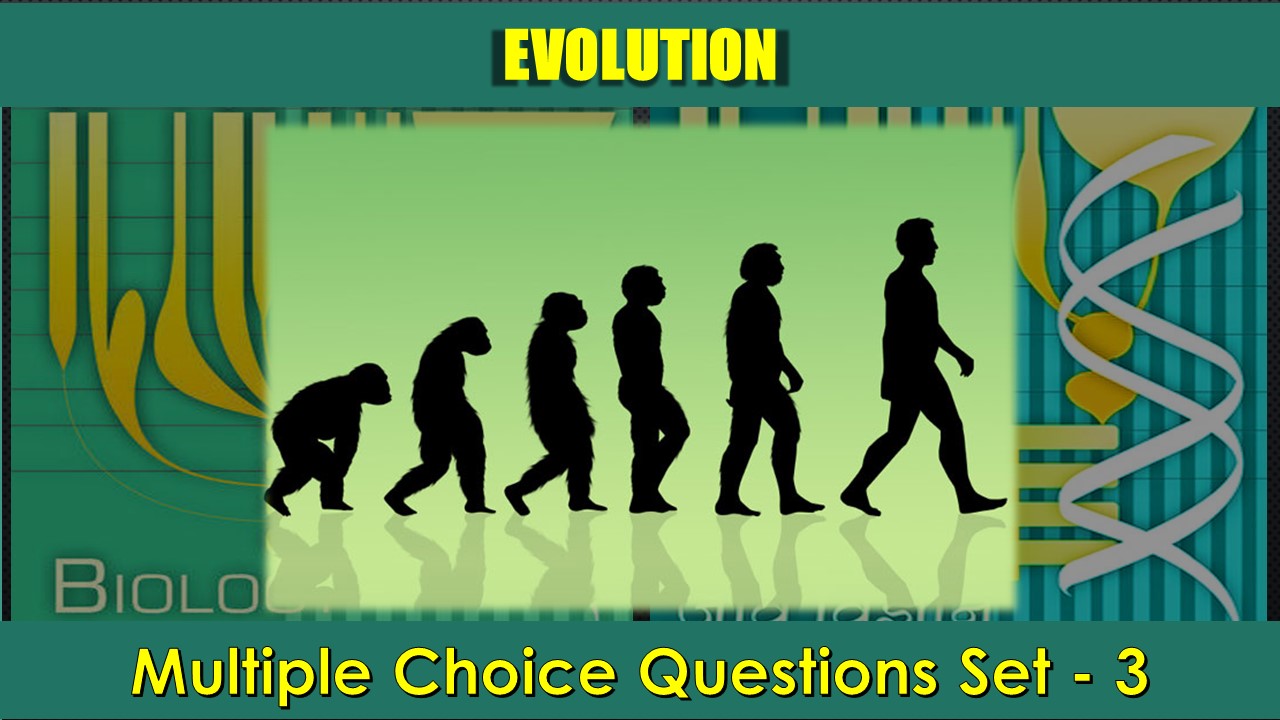CBSE Class 12 Evolution Multiple Choice Questions with Answers. MCQ Questions Class 12 Evolution with Answers Is Prepared Based on Latest Exam Pattern. Students can solve NCERT MCQ questions Class 12 Evolution with Answers to know their preparation level.
Students who are searching for NCERT MCQ Questions Class 12 Evolution with Answers are compiled here to get good practice on all fundamentals. Know your preparation level on MCQ Questions for Class 12 Evolution with Answers. You can also verify your answers from the provided MCQ Class 12 Evolution with Answers. So, ace up your preparation with MCQ of Class 12 Biology Examinations.
MCQ Questions Class 12 Evolution with Answers - Set - 3
Question 1:
Most abundant organic compound on earth is
(a) protein
(b) cellulose
(c) lipids
(d) steroids
Correct Answer – (B)
Question 2:
Which of the following amino acids was not found to be synthesised in Miller’s experiment?
(a) Alanine
(b) Glycine
(c) Aspartic acid
(d) Glutamic acid
Correct Answer – (D)
Question 3:
From his experiments, S.L. Miller produced amino acids by mixing the following in a closed flask.
(a) CH4, H2, NH3 and water vapor at 800°C
(b) CH3, H2, NH4 and water vapor at 800°C
(c) CH4, H2, NH3 and water vapor at 600°C
(d) CH3, H2, NH3 and water vapor at 600°C
Correct Answer – (A)
Question 4:
Wings of Butterfly and birds are:
(a) Vestigial organs
(b) Analogous organs
(c) Homologous organs
(d) Both (a) and (b)
Correct Answer – (B)
Question 5:
Which one of the following phenomenon supports Darwin’s concept of natural selection in organic evolution?
(a) Development of transgenic animals
(b) Production of‘Dolly the sheep’ by cloning
(c) Prevalence of pesticide resistant insects
(d) Development of organs from ‘Stem cells’ for organ transplantation
Correct Answer – (C)
MCQ Questions Class 12 Evolution With Answers
Question 6:
Homo sapiens have evolved in
(a) Paleocene
(b) Pleistocene
(c) Oligocene
(d) Holocene
Correct Answer – (D)
Question 7:
The idea of mutations was brought forth by
(a) Hugo de Vries who worked on evening primrose
(b) Gregor Mendel who worked on Pisum sativum
(c) Hardy-Weinberg who worked on allele frequencies in a population
(d) Charles Darwin who observed a wide variety of organisms during sea voyage.
Correct Answer – (A)
Question 8:
Theory of Pangenesis was given by:
(a) Darwin
(b) Lamarck
(c) Weismann
(d) DeVries
Correct Answer – (A)
Question 9:
The biogenetic law of Haeckel is:
(a) Ominis vivum-e-eellula
(b) Omminis cellula-e-cellula
(c) Ontogeny repeats phytogeny
(d) Phytogeny repeats ontogeny
Correct Answer – (C)
Question 10:
Book ‘Philosophique Zoologique’ was written by:
(a) Lamarck
(b) Mendel
(c) Darwin
(d) Hugo-devries
Correct Answer – (B)
- NCERT Solutions Class 11 Chemistry Chapter 1 : Some Basic Concepts of Chemistry
- NCERT Solutions Class 11 Chemistry Chapter 2 : Structure Of The Atom
- NCERT Solutions Class 11 Chemistry Chapter 3 : Classification of Elements and Periodicity in Properties
- NCERT Solutions Class 11 Chemistry Chapter 4 : Chemical Bonding and Molecular Structure
- NCERT Solutions Class 11 Chemistry Chapter 5 : States of Matter
- NCERT Solutions Class 11 Chemistry Chapter 6 : Thermodynamics
- NCERT Solutions Class 11 Chemistry Chapter 7 : Equilibrium
- NCERT Solutions Class 11 Chemistry Chapter 8 : Redox Reactions
- NCERT Solutions Class 11 Chemistry Chapter 9 : Hydrogen
- NCERT Solutions Class 11 Chemistry Chapter 10 : The s-Block Elements
- NCERT Solutions Class 11 Chemistry Chapter 11 : The p-Block Elements
- NCERT Solutions Class 11 Chemistry Chapter 12 : Organic Chemistry: Some Basic Principles and Techniques
- NCERT Solutions Class 11 Chemistry Chapter 13 : Hydrocarbons
- NCERT Solutions Class 11 Chemistry Chapter 14 : Environmental Chemistry




